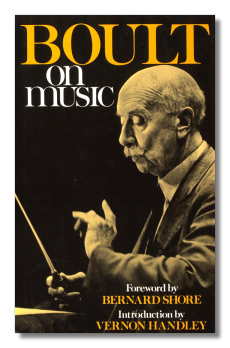
The Internet's Premier Classical Music Source
Related Links
-
Introduction
Acoustics
Ballet
Biographies
Chamber Music
Composers & Composition
Conducting
Criticism & Commentary
Discographies & CD Guides
Fiction
History
Humor
Illustrations & Photos
Instrumental
Lieder
Music Appreciation
Music Education
Music Industry
Music and the Mind
Opera
Orchestration
Reference Works
Scores
Thematic Indices
Theory & Analysis
Vocal Technique
Search Amazon
Recommended Links
Site News
 Book Review
Book Review
This book's nearly 200 pages are comprised of the text of broadcasts recorded for BBC radio and essays written by the late Sir Adrian Boult. It is one collection that will appeal not only to the conductor's many fans, but to those interested in classical music in general. It includes his commentary on a broad range of musical subjects from the art of conducting and conductors themselves (including Toscanini, Nikisch, and Beecham) to composers (including Elgar, Vaughan Williams, Rachmaninoff, and Ravel) to compositions (Schubert's Ninth and Vaughan Williams' Symphonies, to cite just two examples, get considerable analysis) to opinion on subjects like "Soloists as Conductors" (Boult generally didn't approve) and "Is A Conductor Really Necessary?" (You guess his opinion on this one.)
I found Boult's comments made at the time of the death of Rachmaninoff quite intriguing and fascinating, if not earthshaking. He spoke of the composer's "cynical sense of humour, and delight… in the macabre… " Perhaps this revelation helps explain Rachmaninoff's fascination with the dies irae theme in his compositions. Boult tells of Sir Edward Elgar's "grumpiness," and recounts one incident in which the composer rather impolitely leaves his host's house for a walk to avoid hearing a young singer who had wanted to meet him. Not that Boult paints a negative view of Elgar here – he merely presents an even-handed one.
Boult speaks of one issue that so often arises on the concert stage: the soloist vs. the conductor when interpretation is not mutually agreed upon. Surprisingly, he sides with the soloist, who has "spent 100 hours practising and thinking about the concerto to every one spent by the conductor… "
All in all, this book fascinates and not only gives the reader a window into the many rooms of the classical musical world, but also into the mind of a most interesting genius.
Copyright © 1998, Robert Cummings.



















